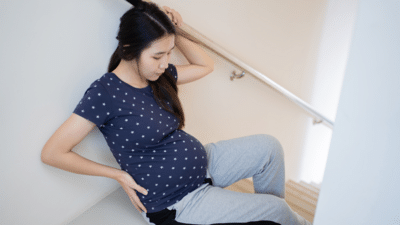Clumsiness during pregnancy is something a lot of people notice, and it’s totally normal. Your body is going through major changes, and sometimes that makes you a little unsteady. You might drop things, bump into furniture, or lose your balance more easily. It can feel frustrating, but it’s just your body adjusting to support your growing baby.
Hormones, shifting weight, and tired muscles all play a role in making movements feel trickier than before. Understanding these changes can help you take simple steps to stay steady and safe as your pregnancy progresses.
When Does Clumsiness During Pregnancy Start?You might start feeling a little wobbly on your feet as early as the first trimester, but for most people, that clumsy feeling really kicks in during the second trimester when your bump begins to grow. By the third trimester, when your belly feels heavy and your baby is pressing down on your pelvis, it’s totally normal to feel like you’re bumping into things more often.
It’s super common and usually just a quirky side effect of all the changes your body’s going through.
Why Am I So Clumsy During Pregnancy?Your body’s putting in extra effort to grow your baby, and that can mess with your balance. Here’s what’s going on:
- Shifting centre of gravity: Your growing bump pulls your centre of balance forward. This makes everyday moves like climbing stairs or walking on slippery surfaces trickier.
- Hormonal changes: Pregnancy hormones make your joints and ligaments looser, especially in your pelvis, knees, and even your fingers. It’s your body’s way of preparing for birth, but it can also affect your posture and make your grip feel less steady.
- Swelling and fluid retention: Extra fluid in your feet and legs can make your shoes tighter, changing how you walk. Fluid in your eyeballs during the third trimester might even affect your vision and make it harder to spot obstacles.
- Carpal tunnel syndrome: All that extra fluid can press on the nerves in your wrists, causing pain, tingling, or numbness in your hands. This weakens your grip and makes you more likely to drop things.
- Weak abdominal muscles: In late pregnancy, your “six-pack” muscles might separate (a condition called diastasis recti). It weakens your core and impacts how you move.
- Fatigue and forgetfulness: Pregnancy exhaustion and that foggy “pregnancy brain” can make you less aware of your surroundings, so you might trip over clutter.
- Low back pain: Your lower back works overtime to support your growing bump. The extra strain and shifting curve of your spine can make you feel off-balance or wobbly when you move.
How Can I Safely Manage Clumsiness During Pregnancy?Feeling clumsy might be annoying, but it’s usually nothing more than a minor inconvenience. Still, it’s smart to be careful. A bad fall during pregnancy can sometimes cause problems.
These are some ways to keep your balance and stay safe:
- Take your time, especially in slippery spots like the shower or on wet floors. Rushing around only makes it easier to lose your balance, so give yourself a few extra minutes to move safely.
- Put the high heels away for now and go for comfortable, stable shoes with rubber soles and proper arch support.
- Keep hallways and stairs free of clutter. Secure loose rugs with tape or padding to avoid tripping, and always use handrails on stairs.
- Skip climbing ladders or standing on chairs. Let someone else handle heavy lifting or bulky loads.
- A support belt can take pressure off your back and hips, helping you stand taller and feel more stable.
- Gentle, pregnancy-safe exercises like prenatal yoga or pilates can do wonders for your balance. They help strengthen your muscles and make you more confident on your feet.
- Activities like cycling aren’t ideal during pregnancy. Stick to low-impact options like walking or swimming instead.
- If swelling’s an issue, drink plenty of water to avoid dehydration, which can worsen fluid retention.
Will Clumsiness During Pregnancy Harm My Baby?Here’s the reassuring part: your baby is safely tucked inside your pelvis and surrounded by a soft cushion of amniotic fluid. That means most small slips or gentle falls won’t cause any harm. Still, a direct fall on your belly can sometimes be more serious.
In rare cases, it could cause placental abruption (where the placenta separates from the uterus).
When Should I Worry About Clumsiness During Pregnancy?Reach out to your doctor immediately if you’re feeling clumsy, along with:
- Severe headaches
- Blurred vision or flashing lights
- Sharp pain under your ribs
- Vomiting
- Sudden swelling in your face, hands, or feet
- Rapid weight gain from fluid retention
- Feeling very unwell
These could signal preeclampsia, a serious type of high blood pressure in pregnancy that needs urgent care.
Clumsiness during pregnancy is completely normal and just part of your body adjusting as it supports your growing baby. While it might feel like you’re juggling with two left hands, it won’t last forever. So go easy on yourself and laugh off those awkward, wobbly moments.
Whether you’re pregnant, a new mom, or navigating postpartum, you don’t have to do it alone. Join our support group to connect, share, and support one another.
FAQs on Feeling Clumsy While Pregnant? Here’s What’s Really Going On
Does carrying multiples increase clumsiness?
Yes, carrying twins or more adds extra weight and shifts your centre of gravity. This makes balance and movement trickier than with a single pregnancy.
Can anaemia during pregnancy cause clumsiness?
Yes, low iron can reduce oxygen supply to your brain and muscles. This can cause dizziness, weakness, and coordination issues, making you feel clumsy.